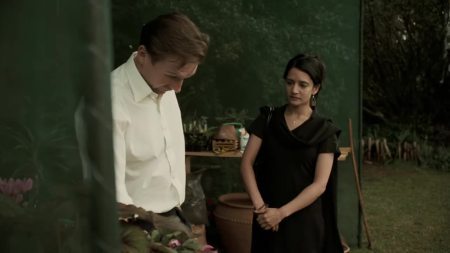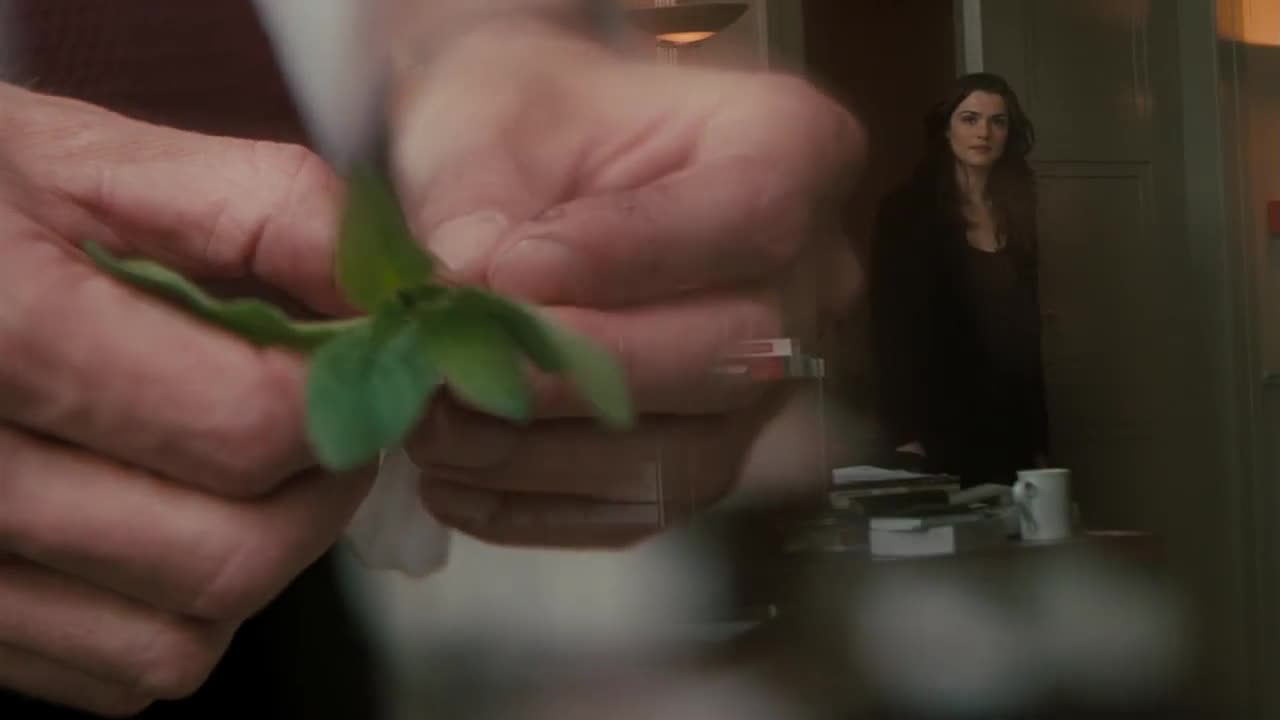Andrew Kendall looks back at The Constant Gardener for its 10th anniversary...
"This whole machine is driven by guilt."
To look back, after ten years, at the overly stylised hand-held camera visual style of The Constant Gardener, it might not seem particularly noteworthy; but, the almost unintelligible camerawork of Fernando Meirelles' first English language film, just off the success of City of God, remains key to what makes The Constant Gardener one of the century's most effective (pseudo)-political thrillers. True, it has faded in history as one of the slew of dramas that tried to break into that impenetrable 2005 Best picture line-up. We remember it for Rachel Weisz’s luminous Oscar winning turn, but The Constant Gardener has more to offer than just its place in awards history – it’s an unflinching, exact, and effective film which has not lost its vigour in the ten years since it premiered.
Low-level diplomat Justin Quayle moves to Kenya with a woman he recently met as his wife. She is much more luminous than this self-effacing man who buries his head in his gardening and is unaware that his wife is uncovering a global conspiracy in Kenya. Soon she’s dead and he’s trying to solve the puzzle she's left behind. That’s the short of it, muddied by the fact that The Constant Gardener begins with Tessa’s death and has us hurtling back and forth through timelines to figure out what’s what. The freneticism of the narrative darting from present to immediate past to distant past is not just for show but part of the story's labyrinth where everything said depensds on context.
Emerging from the ostensible confusion, Weisz's Tessa Quayle is the most vivid part in the memory of most. It's the sort of electric turn the film needs. The way she seemed to soar so easily to the Oscar podium has made the performance sour in the minds of many, the fate of so many winners. It's a shame, though, she really is that fantastic making the mystifying and frustratingly hard-headed Tessa real. But, The Constant Gardener's dramatis personae is more than Tessa Quayle. Ralph Fiennes is excellent playing Justin's journey from disinterested dipomat to passionate activist, but watching this time around it’s the excellence of the entire ensemble that shines through - there are the dependable Brits like Bill Nighy and Danny Huston (reticent and austere, and slimy and disgusting respectively). Then there are the actors like Archie Panjabi (before The Good Wife fame) in the type of slight but visceral turn that would land some obscure actor awards love in the seventies; or, French actor Hubert Koundé as Tessa’s confidante and assumed lover. Mereilles is generous in his directing of the actors and Charlone’s sprawling camera allows even the slightest performers to contribute to the breathlessness of the film. There are so many people to keep track of and so many avenues Justin must investigate on the journey to knowledge.

The best thing about The Constant Gardener, which improves on the novel, is the way it becomes a paradox unto itself by juxtaposing the macro issues, like globally entrenched racism, the West’s disregard for Africa and the evil of big pharmaceuticals with micro issues like a self-effacing widower’s grief for the wife he never knew. It is a juxtaposition that holds the film up for easy criticisms of trivialising the real life issues at its centre. However, to truly consider the film for all its motivations is to realise that it depends on this mixture of the micro and the macro. The big pharmaceutical company is carrying out clinical trials on unknowing poor African citizens. Everyone is complicit, the British Government, the Canadian government, the African governments, the diplomats even. The film puts itself up for scrutiny by offering the film to us through the lens of a white man, a British diplomat, no less. But it’s a subversive goodness. It’s like that Nirvana song – “She likes to be, she’s into guilt…guilt.” That’s Justin Quayle, and that’s the movie right there. The Constant Gardener’s claustrophobic texture needs this romantic duo at the centre to work, and their relationship like the larger issues at hand is built on unease.
The guilt suffusing the film and Justin's quest is the same guilt Pete Postlethwaite Dr Lorbeer insists all actions pertaining to African international relations are driven by. Justin's guilt is that he was too buried in his gardening to really know his wife, there's the larger guilt of the whites complicit (even inadvertently) in the rape of Africa. Mereilles is a responsible director, treating the Kenyan landscape as more than than just an exotic "other" for the British cast to interact with. He uses his visual palette in impressive ways, the vibrant colour of the Kenyan streets against the dun dullness of London is stark and telegraphs the way the villains in London become more terrifying for their impassionate ways. It's easy film shorthand to see the poor Kenyans as being closer to goodness in their poorness, but although the film is never about the Kenyans as active participants in the drama it's respectful enough to have more on its mind than, "Look at these poor Africans." The first twenty minutes is as interested in giving us information for the story as it is to play voyeur to the way the Kenyans live.

The Constant Gardener must still confront the question of whether it's the hook of the Caucasian romance in exotic Africa which makes it palatable for audience, thereby proving the theory that there is no commercial weight given to the issues done in Africa. It’s a reading I have seen, but it's a simplistic one that ignores the film before us. In translating the novel to screen Jeffrey Caine is careful not to lionise any of the players. Justin is only interested in the horrors in Africa as a pathway to understanding his dead wife. It’s an inherently selfish motivation, but also a human one and when in the film’s climax he unthinkingly echoes Tessa’ bleeding heart philosophy (Yes, we can't help everyone but this is one person we can help!) the guilt of the narrative falls into place. We never do find out why Tessa is obsessively hellbent on solving crimes done to the African continent. Is she just a bleeding heart (throwaway lines reveal to Justin and to us that she came from a well-monied family, so maybe it was just the guilt of the very rich...). If The Constant Gardener feels occasionally inelegant in its fervour it is because, like its passionate centre, Tessa, it really has no time for subtlety or tact.
 Perhaps, The Constant Gardener could have been told with an African national as a truer lens for the crisis in Kenya, or it could have more emphatically showed the insides of the evils of the pharmaceutical companies, or it could have told us why Tessa was so obsessed with African culture, but it would not be this film and it would not have had the fleeting, effective, but melancholy root that makes The Constant Gardener the sad, opaque, effective film it is.
Perhaps, The Constant Gardener could have been told with an African national as a truer lens for the crisis in Kenya, or it could have more emphatically showed the insides of the evils of the pharmaceutical companies, or it could have told us why Tessa was so obsessed with African culture, but it would not be this film and it would not have had the fleeting, effective, but melancholy root that makes The Constant Gardener the sad, opaque, effective film it is.
When it ends, The Constant Gardener has no great answers to give, the corrupted might be exposed but the film gives us them no real commuppance because in the face of hundreds of years of institutionalied racism what resolution could really be satisfactory? It is why The Constant Gardener leaves us with the self-effacing Justin surrendering to his fate of death. Justin’s interest in uncovering the truth is tied directly to his interest in Tessa, and when his search reaches the end of Tessa interest is spent. There are no real heroes here, only real people with only human interests. It's an unrewarding tragedy, perhaps, but it's a humane and adult one that deserves to be remembered. And although, it's easy to scoff at filmmaking with so clear and relentless an agenda the triumph of The Constant Gardener is that it's a well made drama while still being a legitimate call to arms. I can't help but admire this final shot.

